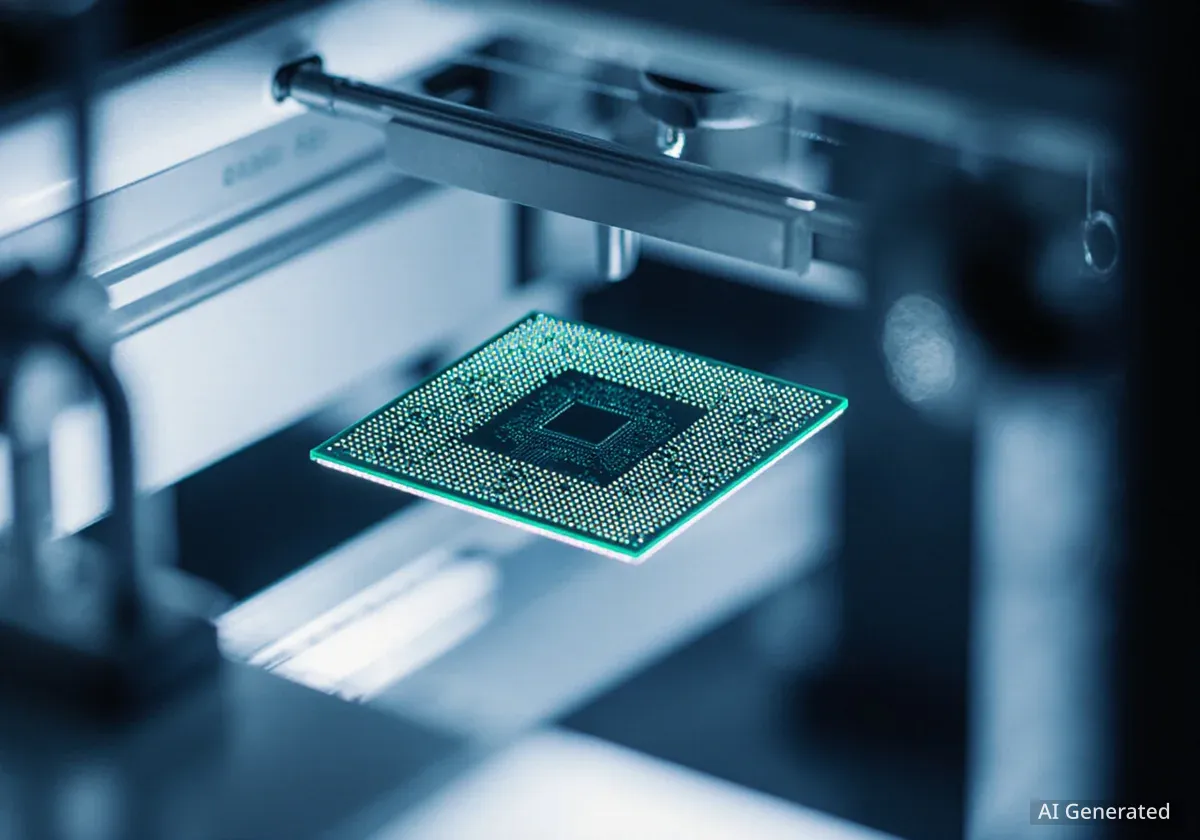Nvidia's stock has surged by 43.4% this year, driven by strong demand for its graphics processing units (GPUs). These GPUs are essential for artificial intelligence (AI) training and inference. The company has also made headlines through significant partnerships, including a $5 billion investment in Intel and a $100 billion agreement with OpenAI, the creator of ChatGPT.
Key Takeaways
- Nvidia's stock has increased by 43.4% year-to-date, fueled by AI chip demand.
- Strategic investments in AI startups, like OpenAI, could create 'circular revenue'.
- Wall Street analysts maintain a 'Strong Buy' rating for Nvidia shares.
- Institutional investors, including Vanguard, hold significant stakes in Nvidia.
- Concerns exist regarding potential valuation pressure from these strategic investments.
Nvidia's Market Performance and Strategic Investments
Nvidia, a leading semiconductor company, has seen its stock perform strongly in the market. The company's graphics processing units (GPUs) are critical components for the rapidly expanding field of artificial intelligence. These GPUs are used for both training AI models and for running AI applications, known as inference.
Beyond direct sales, Nvidia has engaged in several high-profile strategic partnerships. These include a substantial $5 billion investment in Intel, another major player in the semiconductor industry. Additionally, Nvidia secured a significant $100 billion deal with OpenAI, the company behind the popular ChatGPT AI platform.
Nvidia's Growth Snapshot
- Year-to-Date Stock Rally: 43.4%
- Intel Investment: $5 billion
- OpenAI Deal Value: $100 billion
Understanding Nvidia's Ownership Structure
Despite rising competition in the AI chip sector from companies like Advanced Micro Devices (AMD) and Broadcom, financial analysts remain optimistic about Nvidia's future growth. A detailed look into Nvidia's ownership structure provides insight into who holds the company's shares.
According to TipRanks' data, public companies and individual investors collectively own the largest portion of Nvidia, holding 37.96% of the stock. Exchange-Traded Funds (ETFs) follow, owning 21.13% of the AI giant. Mutual funds account for 20.29%, while other institutional investors hold 16.71%. Insiders, typically company executives and board members, own a smaller but notable 3.91%.
Top Institutional Holders
Among the top shareholders, Vanguard holds the largest individual stake, representing 7.78% of Nvidia. Vanguard Index Funds holds a separate 6.97%. These figures highlight the significant presence of large investment firms in Nvidia's ownership.
- Vanguard Total Stock Market ETF: Owns 3% of NVDA stock.
- Vanguard S&P 500 ETF: Holds 2.48% of NVDA stock.
- Fidelity Concord Street Trust: Owns 1.76% of the company.
AI Chip Market Competition
The AI chip market is becoming increasingly competitive. Companies like AMD and Broadcom are investing heavily to develop their own AI-focused processors. This competition could impact Nvidia's market share and pricing power in the long term, though analysts currently view Nvidia's position as strong.
The Concept of 'Circular Revenue' in AI Investments
Nvidia's strategic investments in AI startups, such as OpenAI, have sparked discussions among investors. One key debate centers on what some analysts call 'circular revenue'. This concept suggests that Nvidia's equity stakes in these AI companies could eventually lead to increased GPU sales back to Nvidia, creating a closed loop of revenue.
For example, while OpenAI recently announced a new partnership with Nvidia's competitor, AMD, its broader infrastructure plans still involve significant reliance on Nvidia GPUs. OpenAI's public statements outline intentions for self-built data centers using Nvidia's hardware, alongside initiatives like 'Stargate' and contracts with Oracle.
"When equity investment comes from a supplier, we believe additional scrutiny is warranted given the 'circular' nature of the revenue because of the investor's dual role as investor and supplier," explained Goldman Sachs analyst James Schneider.
Schneider believes OpenAI will likely need substantial equity and debt financing, potentially raising up to $75 billion by 2026. Efforts like Oracle's $18 billion debt raise for OpenAI show strong market interest. The challenge for OpenAI is to translate these investments into profitable growth before securing funding becomes more difficult.
Impact on Nvidia's Valuation
From Nvidia's perspective, this 'circular revenue' could put downward pressure on its valuation multiple. Investors often scrutinize strategic investments in customers that are not yet self-sustaining. The analyst community will closely monitor the underlying financial health of these customer companies.
However, Schneider also views Nvidia's investments as crucial for fostering the broader AI ecosystem. These investments strengthen developer adoption of Nvidia's CUDA software platform. They also signal to investors the significant market opportunity Nvidia sees in AI.
Analyst Outlook on Nvidia
- Consensus Rating: Strong Buy
- Average Price Target: $219.86
- Potential Upside: 14.2%
Nvidia's Near-Term Outlook and Long-Term Risks
Analysts generally expect Nvidia's near-term financial performance to remain strong. Growth is projected to come from both hyperscalers (large cloud service providers) and newer customer segments. Hyperscalers are expected to continue generating the majority of Nvidia's revenue.
While James Schneider maintains a "Buy" rating on NVDA shares, he raised his price target from $200 to $210, indicating a 9% one-year upside. The broader analyst community has an average price target of $219.86, suggesting a 14% upside over the next 12 months. This consensus is based on 35 'Buy' recommendations, two 'Hold' recommendations, and one 'Sell' recommendation.
However, Schneider also expresses caution regarding Nvidia's valuation multiple due to increasing long-term risks. These risks stem from non-traditional customers, such as sovereign entities and startups like OpenAI. Despite these concerns, he believes the 'circular revenue' represents less than 15% of total revenue in 2027, suggesting no significant immediate risk to the overall investment case.
Investors can explore further analyst ratings and stock forecasts for Nvidia to make informed decisions.





